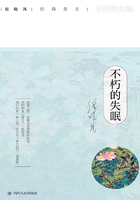WE have not hitherto concerned ourselves, in any express sense, with the ethical elements involved in the tendency now dwelt on, though they are, of necessity, of a very vital character.We have shown only as yet the effect of this mood of mind on dramatic intention and effort.The position is simply that there is, broadly speaking, the endeavour to eliminate an element which is essential to successful dramatic presentation.That element is the eternal distinction, speaking broadly, between good and evil -
between right and wrong - between the secret consciousness of having done right, and the consciousness of mere strength and force in certain other ways.
Nothing else will make up for vagueness and cloudiness here - no technical skill, no apt dialogue nor concentration, any more than "fine speeches," as Mr Pinero calls them.Now the dramatic demand and the ethical demand here meet and take each other's hands, and will not be separated.This is why Mr Stevenson and Mr Henley -
young men of great talent, failed - utterly failed - they thought they could make a hero out of a shady and dare-devil yet really cowardly villain generally - and failed.
The spirit of this is of the clever youth type - all too ready to forego the moral for the sake of the fun any day of the week, and the unthinking selfishness and self-enjoyment of youth - whose tender mercies are often cruel, are transcendent in it.As Stevenson himself said, they were young men then and fancied bad-
heartedness was strength.Perhaps it was a sense of this that made R.L.Stevenson speak as he did of the EBB-TIDE with Huish the cockney in it, after he was powerless to recall it; which made him say, as we have seen, that the closing chapters of THE MASTER OF
BALLANTRAE "SHAME, AND PERHAPS DEGRADE, THE BEGINNING." He himself came to see then the great error; but, alas! it was too late to remedy it - he could but go forward to essay new tales, not backward to put right errors in what was done.
Did Mr William Archer have anything of this in his mind and the far-reaching effects on this side, when he wrote the following:
"Let me add that the omission with which, in 1885, I mildly reproached him - the omission to tell what he knew to be an essential part of the truth about life - was abundantly made good in his later writings.It is true that even in his final philosophy he still seems to me to underrate, or rather to shirk, the significance of that most compendious parable which he thus relates in a letter to Mr Henry James:- 'Do you know the story of the man who found a button in his hash, and called the waiter?
"What do you call that?" says he."Well," said the waiter, "what d'you expect? Expect to find a gold watch and chain?" Heavenly apologue, is it not?' Heavenly, by all means; but I think Stevenson relished the humour of it so much that he 'smiling passed the moral by.' In his enjoyment of the waiter's effrontery, he forgot to sympathise with the man (even though it was himself) who had broken his teeth upon the harmful, unnecessary button.He forgot that all the apologetics in the world are based upon just this audacious paralogism."
Many writers have done the same - and not a few critics have hinted at this: I do not think any writer has got at the radical truth of it more directly, decisively, and clearly than "J.F.M.," in a monthly magazine, about the time of Stevenson's death; and the whole is so good and clear that I must quote it - the writer was not thinking of the drama specially; only of prose fiction, and this but makes the passage the more effective and apt to my point.
"In the outburst of regret which followed the death of Robert Louis Stevenson, one leading journal dwelt on his too early removal in middle life 'with only half his message delivered.' Such a phrase may have been used in the mere cant of modern journalism.Still it set one questioning what was Stevenson's message, or at least that part of it which we had time given us to hear.
"Wonderful as was the popularity of the dead author, we are inclined to doubt whether the right appreciation of him was half as wide.To a certain section of the public he seemed a successful writer of boys' books, which yet held captive older people.Now, undoubtedly there was an element (not the highest) in his work which fascinated boys.It gratified their yearning for adventure.
To too large a number of his readers, we suspect, this remains Stevenson's chief charm; though even of those there were many able to recognise and be thankful for the literary power and grace which could serve up their sanguinary diet so daintily.
"Most of Stevenson's titles, too, like TREASURE ISLAND, KIDNAPPED, and THE MASTER OF BALLANTRAE, tended to foster delusion in this direction.The books were largely bought for gifts by maiden aunts, and bestowed as school prizes, when it might not have been so had their titles given more indication of their real scope and tendency.
"All this, it seems to us, has somewhat obscured Stevenson's true power, which is surely that of an arch-delineator of 'human nature'
and of the devious ways of men.As we read him we feel that we have our finger on the pulse of the cruel politics of the world.
He has the Shakespearean gift which makes us recognise that his pirates and his statesmen, with their violence and their murders and their perversions of justice, are swayed by the same interests and are pulling the same strings and playing on the same passions which are at work in quieter methods around ourselves.The vast crimes and the reckless bloodshed are nothing more nor less than stage effects used to accentuate for the common eye what the seer can detect without them.














